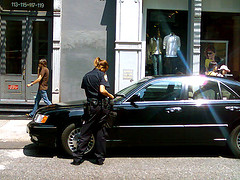Article by Daniel A. Levy, Esq.
As I write this post, it is impossible to turn on the TV or browse social media and ignore the severe tension between police and members of the public. This article is not about the recent incidents with police shooting suspects or the tragic events in Dallas. Rather, it is an article about how to avoid escalating an altercation with the police and at the same time avoiding incriminating yourself or committing further crimes.
The first thing that I want to make very clear to my readers: Unless you called the police because you are a victim of a crime or injured, any time that the police approach you they are investigating you because they think that you are somehow involved in a crime. Obviously, an officer in your neighborhood who says “good morning” is probably just being friendly. But if you are pulled over, stopped in the street by an officer, or an officer comes to your door, they are not trying to be friendly – they are doing their job, and their job is to investigate crimes and quality of life offenses. Many people do not appreciate this when a cop approaches them.
The next thing to understand is that there is a big difference between police “investigating” a person and “interrogating” a person. If an officer is reasonably suspicious, they may perform a non-custodial interrogation, which may only last as long as necessary to dispel that suspicion. An interrogation is what happens when a suspect is in custody, and that can only happen if there is probable cause to believe that the person committed a crime, which is a significantly higher standard.
You cannot physically stop police from investigating (please don’t try), but it is critical that you identify whether they are investigating or interrogating. And the sure-fire way of identifying this is whether you are free to leave. And that is the most important questions to ask police if you are approached: “Am I free to leave?” If the officer says “no” then you are essentially in custody and they believe that there is probable cause. You should then say absolutely nothing, other than to ask for a lawyer and make clear that you are refusing to answer questions (things are a little different for roadside stops because police may stop the vehicle for a short period if there was a traffic infraction and they are reasonably suspicious of additional illegal activity; drivers also have a duty to supply certain documents to officers while a person on the street has no such obligation).
What you should not do is to escalate the situation and get angry with the officer because they approached you. You should not try to explain how you did nothing wrong. You should not argue about how you were right to do whatever action they claim was illegal. Simply ask, “Am I free to leave?” You will be surprised how effective this is. A lot of times officers just have a hunch that someone is “up to no good” and they start questioning them in the hopes that they will incriminate themselves. If your responses are simple “Am I free to leave?” then there is no way that you will incriminate yourself and convert an investigatory stop into a custodial interrogation.



